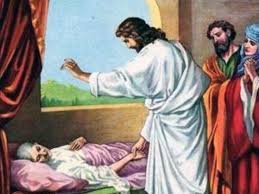Primero que nada Saludarle y desearles que tenga un feliz maravilloso día a todas las personas. Felicitar a todos y todas los integrantes de esta ilustre comunidad cristiana e invitarles para que todos juntos nos coloquemos en comunión con nuestro padre celestial.
En aquel tiempo, algunos hombres fueron a ver a Jesús y le contaron que Pilato había mandado a matar a unos galileos, mientras estaban ofreciendo sus sacrificios. Jesús les hizo este comentario:
“¿Piensan ustedes que aquellos galileos, porque les sucedió esto, eran más pecadores que todos los demás galileos? Ciertamente que no; y si ustedes no se convierten, perecerán de manera semejante.
Y aquellos dieciocho que murieron aplastados por la torre de Siloé, ¿piensan acaso que eran más culpables que todos los demás habitantes de Jerusalén? Ciertamente que no; y si ustedes no se arrepienten, perecerán de manera semejante”. Entonces les dijo esta parábola: “Un hombre tenía una higuera plantada en su viñedo; fue a buscar higos y no los encontró.
Dijo entonces al viñador: ‘Mira, durante tres años seguidos he venido a buscar higos en esta higuera y no los he encontrado. Córtala. ¿Para qué ocupa la tierra inútilmente?’ El viñador le contestó: ‘Señor déjala todavía este año; voy a aflojar la tierra alrededor y a echarle abono, para ver si da fruto. Si no, el año que viene la cortare’”.
REFLEXIÓN: Evocando las promesas que Dios hizo a Abraham y a sus descendientes, San Pablo reafirma su convicción de que el cristiano ha sido liberado del dominio de la ley, del pecado y de la muerte por una maravillosa intervención de Dios.
La libertad de quienes –como Abraham, estamos llamados a «esperar contra toda esperanza»– reside en la presencia vivificante y transformadora del Espíritu. Él es fruto de la muerte y de la resurrección de Cristo, y garantía segura de la futura resurrección de nuestros cuerpos mortales.
Jesús, interpretando dos tristes sucesos, manifiesta la exigencia fundamental de la vida cristiana: hacer penitencia, arrepintiéndonos con sinceridad de lo mal hecho. A partir de acontecimientos como éstos y frente a nuestro incierto futuro, Él nos exhorta a estar prevenidos para el inexorable juicio divino.
Las desgracias no son necesariamente un castigo, sino invitación a una mejora de vida. No venimos al mundo para ser simples plantas de ornato, sino árboles que –en contraposición a la higuera de la parábola– den en abundancia el fruto esperado.

Imagen De Dominio Publico Fuente
First of all, say hello and wish everyone a happy and wonderful day. Congratulate each and every member of this illustrious Christian community and invite them so that all together we place ourselves in communion with our heavenly father.
At that time, some men went to see Jesus and told him that Pilate had had some Galileans killed while they were offering their sacrifices. Jesus made this comment to them:
“Do you think that those Galileans, because this happened to them, were more sinful than all the other Galileans? Certainly not; and if you do not convert, you will likewise perish. And those eighteen who were crushed to death by the tower of Siloam, do you think that they were more guilty than all the other inhabitants of Jerusalem? Certainly not; and if you do not repent, you will likewise perish.” Then he told them this parable: “A man had a fig tree planted in his vineyard; went to look for figs and did not find them.
He then said to the vinedresser: 'Look, for three years in a row I have come looking for figs on this fig tree and have not found them. Cut it off. Why do you occupy the land uselessly?' I am going to loosen the earth around it and put fertilizer on it, to see if it bears fruit. If not, next year I will cut it.
REFLECTION: Evoking the promises that God made to Abraham and his descendants, Saint Paul reaffirms his conviction that the Christian has been freed from the dominion of the law, sin and death by a marvelous intervention of God.
The freedom of those of us who – like Abraham, are called to “hope against all hope” – resides in the life-giving and transforming presence of the Spirit. He is the fruit of the death and resurrection of Christ, and a sure guarantee of the future resurrection of our mortal bodies.
Jesus, interpreting two sad events, manifests the fundamental requirement of the Christian life: to do penance, sincerely repenting of the wrong done. From events like these and facing our uncertain future, He exhorts us to be prepared for the inexorable divine judgment.
Misfortunes are not necessarily a punishment, but an invitation to improve life. We do not come into the world to be simple ornamental plants, but trees that – in contrast to the fig tree in the parable – bear the expected fruit in abundance.

https://steemit.com/hive-108514/@steemchurch/heartfarms-or-appics-or-update-february-2022-or
Downvoting a post can decrease pending rewards and make it less visible. Common reasons:
Submit